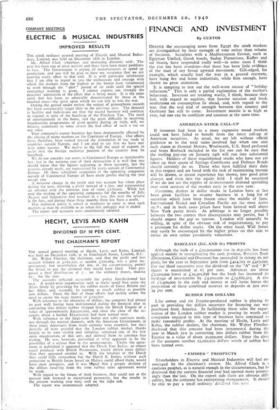FINANCE AND INVESTMENT
By CUSTOS
DESPITE the encouraging news from Egypt the stock markets are distinguished by their strength of tone rather than volume of business. Securities with a Mediterranean flavour, such as Egyptian Unified, Greek bonds, Sudan Plantations, Kaffirs and oil shares, have responded really well—in some cases I think the rise has been overdone—but there has been little evidence of the start of any broad upward movement. Gilt-edged, for example, which usually lead the way in a general recovery, have hung fire and home industrials, while firm enough, have shown no great animation.
It is tempting to trot out the well-worn excuse of " holiday influences." This is only a partial explanation of the market's behaviour. Investors are treading warily, I think, because they feel, with regard to equities, that heavier taxation and fresh restrictions on consumption lie ahead, and, with regard to the war, that the real trial of strength between this country and Germany has still to come. Investment morale is as high as ever, but one can be confident and cautious at the same time.
AMERICAN STOCK CALL-UP
If investors had been in a more expansive mood markets could not have failed to benefit from the latest call-up of American securities. As usual, we are left without official guidance as to the total sums involved but when one sees such shares as General Motors, Woolworth, U.S. Steel preferred and Sears Roebuck included in the list one can be sure that the sterling pay-out on January 14th will run into substantial figures. Holders of these requisitioned stocks who have not yet taken up their quota of Savings Certificates and Defence Bonds should certainly do so. Those who have fulfilled their duty in this respect and are faced with the task of maintaining income will be drawn, -as recent experience has shown, into good prior charges and even into the equity field. I shall be surprised if we do not see the ripples of re-investment demand spreading over most sections of the market early in the new year.
Meantime, dealers in dollar stocks in London have at last been given facilities to resume business in a long list of securities which have been frozen since the middle of June. International Nickel and Canadian Pacific are the most active ste s and in both cases prices have been hoisted well above New York parity levels. As arbitrage is no longer possible between the two centres then discrepancies may persist, but I should expect the gap to narrow. London will naturally be willing, in spite of the obvious risk of requisitioning, to pay a premium for dollar stocks. On the other hand, Wall Street may easily be encouraged by the higher prices on this side to revise its own rather pessimistic valuations.
BARCLAYS (D.C. AND 0.) PROFITS Although the bulk of a £20,000,0000 rise in deposits has been applied mainly in strengthening the cash position, Barclays Bank (Dominion, Colonial and Overseas) has succeeded in raising its net profit for the year to September 30th from £414,703 to £423,692. For the third successive year the dividend on the "A" and " B " shares is maintained at 6 per cent. Advances are about £2,000,000 lower at £30,301,898 but the bank has increased its holdings of investments by L4,500,000 to £34,680,315. A rise of f,8,400,00o in the cash and money at call items leaves the proportion of these combined reserves to deposits at just over 34 per cent.
RUBBER FOR DOLLARS Like cotton and tin Empire-produced rubber is playing its part in providing the dollars necessary for financing our war purchases from America. In facilitating these sales the organ- isation of the London rubber market is proving its worth and companies engaged in this type of business have continued to make reasonable profits. At the meeting of Hecht, Levis and Kahn, the rubber dealers, the chairman, Mr. Walter Fletcher, disclosed that this concern had been instumental during the year to March 31st in converting into dollars rubber from the Empire to a value of about 30,000,000 dollars. Since the close of the accounts another 15,000,000 dollars worth of rubber had been turned over.
EMMIES " PROSPECTS
Shareholders in Electric and Musical Industries will feel en- couraged by the chairman's review. Mr. Alfred Clark is a cautious prophet, as is natural enough in the circumstances, but he disclosed that the current financial year had opened more promis- ingly than the last. On the export side there are obvious diffi- culties, but-the company has enterprising management. It should be able to pay a small ordinary dividend this ye-tr.


























 Previous page
Previous page